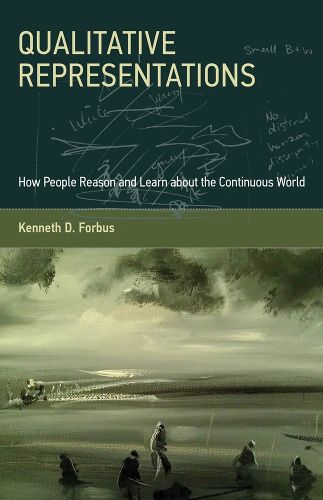Readings Newsletter
Become a Readings Member to make your shopping experience even easier.
Sign in or sign up for free!
You’re not far away from qualifying for FREE standard shipping within Australia
You’ve qualified for FREE standard shipping within Australia
The cart is loading…






An argument that qualitative representations-symbolic representations that carve continuous phenomena into meaningful units-are central to human cognition.In this book, Kenneth Forbus proposes that qualitative representations hold the key to one of the deepest mysteries of cognitive science- how we reason and learn about the continuous phenomena surrounding us. Forbus argues that qualitative representations-symbolic representations that carve continuous phenomena into meaningful units-are central to human cognition. Qualitative representations provide a basis for commonsense reasoning, because they enable practical reasoning with very little data; this makes qualitative representations a useful component of natural language semantics. Qualitative representations also provide a foundation for expert reasoning in science and engineering by making explicit the broad categories of things that might happen and enabling causal models that help guide the application of more quantitative knowledge as needed. Qualitative representations are important for creating more human-like artificial intelligence systems with capabilities for spatial reasoning, vision, question answering, and understanding natural language. Forbus discusses, among other topics, basic ideas of knowledge representation and reasoning; qualitative process theory; qualitative simulation and reasoning about change; compositional modeling; qualitative spatial reasoning; and learning and conceptual change. His argument is notable both for presenting an approach to qualitative reasoning in which analogical reasoning and learning play crucial roles and for marshaling a wide variety of evidence, including the performance of AI systems. Cognitive scientists will find Forbus’s account of qualitative representations illuminating; AI scientists will value Forbus’s new approach to qualitative representations and the overview he offers.
$9.00 standard shipping within Australia
FREE standard shipping within Australia for orders over $100.00
Express & International shipping calculated at checkout
An argument that qualitative representations-symbolic representations that carve continuous phenomena into meaningful units-are central to human cognition.In this book, Kenneth Forbus proposes that qualitative representations hold the key to one of the deepest mysteries of cognitive science- how we reason and learn about the continuous phenomena surrounding us. Forbus argues that qualitative representations-symbolic representations that carve continuous phenomena into meaningful units-are central to human cognition. Qualitative representations provide a basis for commonsense reasoning, because they enable practical reasoning with very little data; this makes qualitative representations a useful component of natural language semantics. Qualitative representations also provide a foundation for expert reasoning in science and engineering by making explicit the broad categories of things that might happen and enabling causal models that help guide the application of more quantitative knowledge as needed. Qualitative representations are important for creating more human-like artificial intelligence systems with capabilities for spatial reasoning, vision, question answering, and understanding natural language. Forbus discusses, among other topics, basic ideas of knowledge representation and reasoning; qualitative process theory; qualitative simulation and reasoning about change; compositional modeling; qualitative spatial reasoning; and learning and conceptual change. His argument is notable both for presenting an approach to qualitative reasoning in which analogical reasoning and learning play crucial roles and for marshaling a wide variety of evidence, including the performance of AI systems. Cognitive scientists will find Forbus’s account of qualitative representations illuminating; AI scientists will value Forbus’s new approach to qualitative representations and the overview he offers.